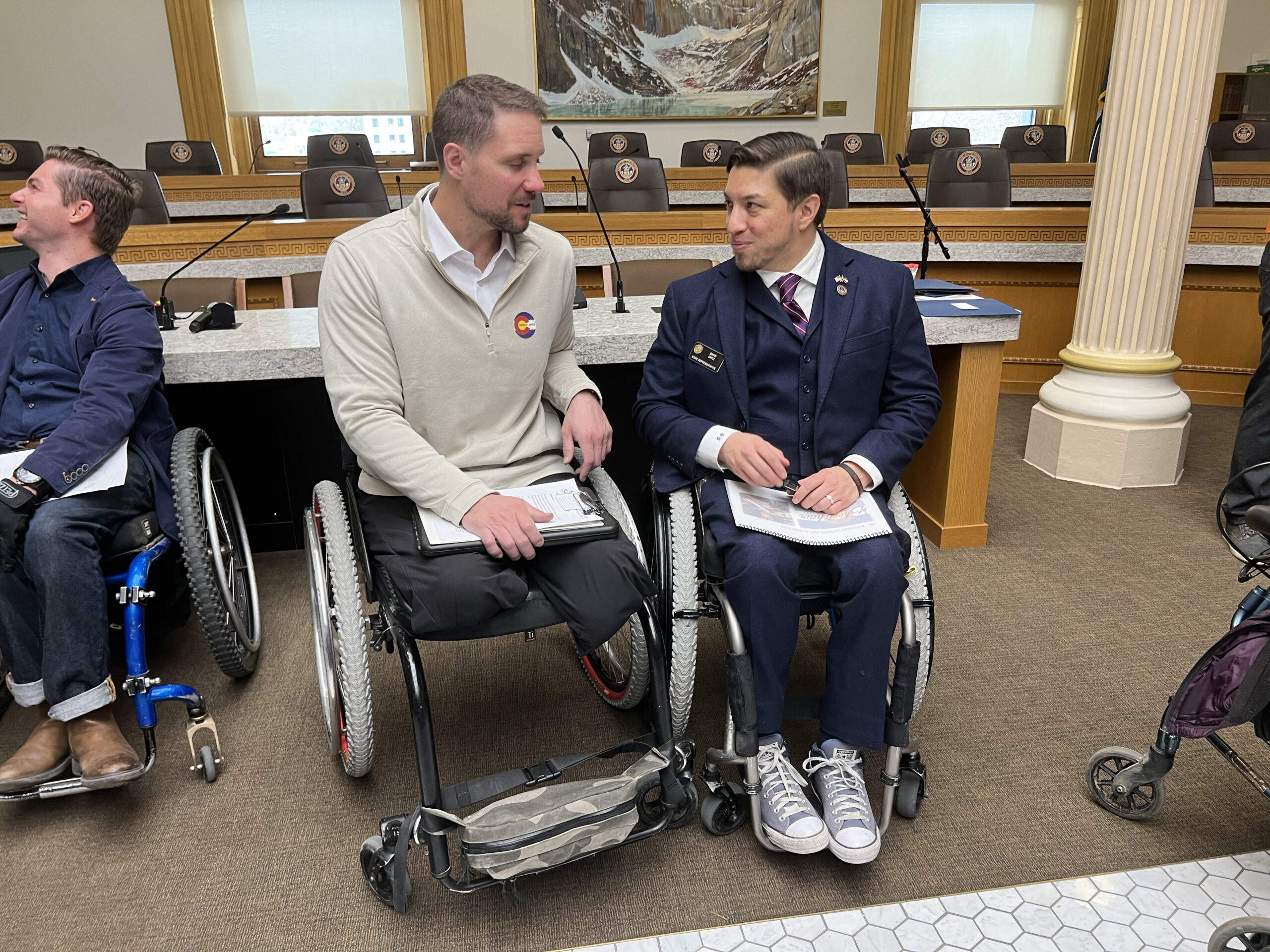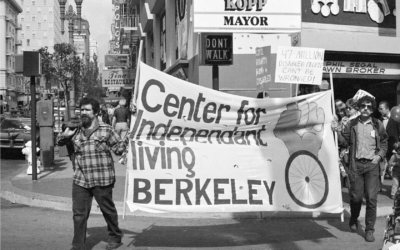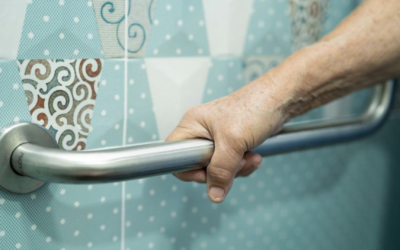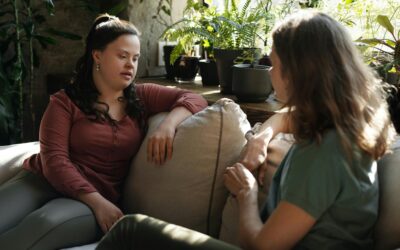(CPWD Community Organizer Craig Towler talks with Rep. David Ortiz at the Denver Capitol in March of 2023. image description: Craig is on the left, sitting in a wheelchair. He wears a tan pullover and black pants, which are folded up under his knees. Rep. Ortiz wears a dark blue suit.)
CPWD is a Center for Independent Living (CIL). We are a unique kind of nonprofit organization that focuses on assisting people with disabilities at achieving and maintaining independent living. In addition to direct services for people with disabilities, we also conduct another very important function; systems advocacy.
Systems advocacy is an ongoing effort to influence or change the policies, laws, regulations, and other systems that affect the ability of people with disabilities to live independently. Sometimes this means creating a new law or system that increases accessibility, equity and equality for people with disabilities; sometimes this means working to undo, reform or eliminate a policy or systems that presents a barrier to independence; and sometimes this means making efforts to ensure compliance with an existing law or policy, such as the accessibility requirements outlined in the ADA.
When we think about successful independent living for people with disabilities, we often think of things like freedom of choice, having one’s own accessible home, opportunities for employment, the ability to connect socially with others and in community, and access to benefits and medical care as needed. But we don’t always realize that all of these aspects of independence are based on systems, policies and laws, many of which were hard fought for by systems advocates in years past. For example, equal opportunity employment (yes, compliance is not 100% and we have a long way to go), accessible transportation, social security disability insurance, curb cuts, and many, many other aspects of living that support independence exists because at one time, someone or many advocated for a change in the systems and policies.
In this way, systems advocacy is as important as individual advocacy, independent living skills training, peer support, and other core services provided by CPWD and other CILs. In 2023, the CPWD made significant steps in the area of systems advocacy. Looking at 2024, we aim to continue and grow our systems advocacy efforts.
A Quick Look Back
In 2023, we effectively advocated for bill HB- HB23-1136, also known as the Prosthetics for Recreational Activities Bill. This bill requires insurance carriers to cover the cost of a second prosthetic device that would allow for recreational activities. Prior to this, only one prosthetic device that was deemed “medically necessary” was covered under insurance. Usually, medically necessary prosthetics were not suitable for recreation or more active movement, and could often cause secondary injury or break if used in that way. The cost of prosthetics for recreation was often too high for many people with disabilities. This insurance limitation created a limitation of freedom and movement for people with limb loss, and a barrier to independence. With the sponsorship of Representative David Ortiz and the support of other lawmakers and advocacy groups, in May 2023, the new bill was passed. Now, one more barrier to independence has been removed: people with limb loss are entitled to a second prosthetic specifically designed for recreation and active movement.
(Watch this video on Limb Loss and bill HB23-1136 to learn more)
CPWD also joined the Campaign to End Discrimination Based on Source of Income. The primary objective of the campaign was to put an end to housing discrimination against housing voucher holders and individuals with other public benefit sources of income. In collaboration with the Denver Metro Fair Housing Center, the campaign involves various endorsing organizations, including CPWD.
What We’re Working on in 2024
Universal Design

Image description: A wheelchair ramp is pictured on the outside of a building.
Moving into 2024, we are continuing to build upon our successes and expand our systems advocacy efforts. For example, CPWD is currently working in partnership with Institute for the Built Environment at Colorado State University and The Independence Center to draft a bill for the Universal Design Standard Tax Incentive Act in Colorado. Universal Design (UD) is an inclusive design approach focused on creating environments and products that are accessible to people of all abilities, ages, and backgrounds without the need for adaptation.
The Universal Design Standard Tax Incentive Act aims to mandate the incorporation of Universal Design principles into new construction projects across Colorado. The bill seeks to promote accessibility and inclusivity in housing, ultimately fostering more livable communities for individuals with disabilities and the growing aging populations.
Social Security Reform
In addition to advocating for legislative changes at the state level, CPWD is also actively addressing systemic challenges within the social security processing system. The current process to apply for social security disability benefits often imposes significant financial burdens on individuals due to the prolonged processing time for applicants and the lump-sum nature of benefit payments. Currently, the wait times for approval are long – up to 18 months, and appealing a denial can take even longer. And, when someone is approved and gets a lump sum for time passed, they are often hit with a big tax bill as that benefits payment is considered income. CPWD is working with the Social Security Administration (SSA) and Colorado legislators to remedy this burden by presenting bills that reduce the tax burden and highlighting the time issues to the SSA. Already, the SSA has said they will look into ways to remedy this challenge. By advocating for reforms to streamline the processing of social security benefits, CPWD hopes to alleviate financial hardships and improve the economic security of individuals with disabilities.
Immigration Reform
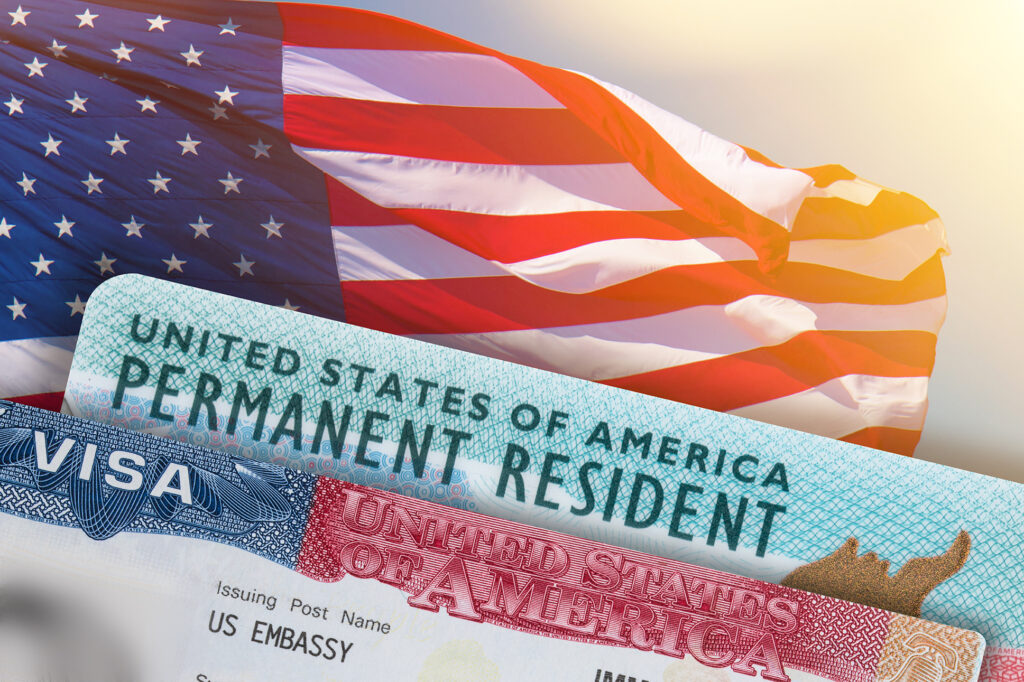
The edge of a green card that says “United States of American Permanent Resident” is shown in front of an American flag.
CPWD is actively advocating for immigration reform to address the unique needs of individuals with disabilities and their families. The existing immigration system has created considerable barriers for siblings of naturalized Americans looking to immigrate to the United States. This includes those requiring home care and support due to disabilities. On average, people who are seeking sibling sponsorship wait 15 – 16 years before being granted a green card. This has been known to extend, in some cases, up to 25 years. Through targeted advocacy efforts and partnerships with legislators, CPWD is pushing to prioritize the immigration processing of family members with disabilities. This will ensure timely access to vital support services, as well as opportunities for siblings to be the caregivers of those family members who have disabilities and are already living in the United States.
Accessible Voting
CPWD also remains committed to widespread accessibility and inclusivity in the election process. Some reports indicate that 1 in 7 people with disabilities have difficulty voting and that due to access barriers, people with disabilities nationally vote at a 3.6% lower rate. CPWD’s goal is to remove barriers to political participation and ensure that individuals with disabilities can exercise their right to vote independently and confidently. In 2023, in partnership with Molly Fitzpatrick, the Boulder County Clerk and Recorder, we provided disability etiquette to election judges, and will be continuing this necessary education in 2024, beginning in February. This year we are also offering accessible voting at our offices for both the primary and general election.
As we move into 2024, CPWD remains dedicated to systems advocacy and dismantling barriers to accessibility, and advancing the principles of the Independent Living Movement. As the year unfolds, we will undoubtedly engage in several important systems advocacy efforts as they are brought to our attention.
By amplifying the voices of the disability community, advocating for policy reforms, and fostering collaborative partnerships, CPWD is working to create a more accessible, inclusive, and equitable society where every individual has the opportunity to thrive and participate fully in community life to the best of their individual potential. We look forward to sharing with you our progress with each of these important issues over the next year. Be sure to subscribe to our newsletter and follow us on social media for regular updates!


